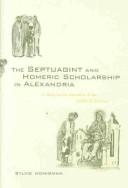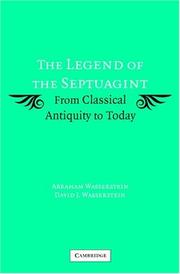| Listing 1 - 5 of 5 |
Sort by
|

ISBN: 0415280729 0203498771 9780203498774 9780415518543 0415518547 1134462956 9781134462957 128002478X 020359956X 9781134462902 9781134462940 9780415280723 Year: 2003 Publisher: London ; New York, NY : Routledge,
Abstract | Keywords | Export | Availability | Bookmark
 Loading...
Loading...Choose an application
- Reference Manager
- EndNote
- RefWorks (Direct export to RefWorks)
The Letter of Aristeas tells the story of how Ptolemy Philadelphus of Egypt commissioned seventy scholars to translate the Hebrew Bible into Greek. Long accepted as a straightforward historical account of a cultural enterprise in Ptolemaic Alexandria, the Letter nevertheless poses serious interpretative problems. Sylvie Honigman argues that the Letter should not be regarded as history, but as a charter myth for diaspora Judaism. She expounds its generic affinities with other works on Jewish history from Ptolemaic Alexandria, and argues that the process of transla
Homer
---
Letter of Aristeas.
---
Bible.
---
Versions
---
Septuagint.
---
221.05*2
---
221.02*3
---
Septuagint (LXX) en andere Griekse vertalingen
---
Oud Testament: bijbelse filologie: grieks; septuagint
---
Aristeas' epistle
---
Aristeas' letter
---
Aristeas to Philocrates
---
Aristeae Historia LXXII interpretum
---
Historia LXXII interpretum
---
Aristeae Ad Philocratem epistula
---
Ad Philocratem epistula
---
Aristeasbrief
---
221.02*3 Oud Testament: bijbelse filologie: grieks; septuagint
---
221.05*2 Septuagint (LXX) en andere Griekse vertalingen
---
Homer.
---
Septuaginta.
---
Aristeas,
---
Aristeas
Book
ISBN: 3110431343 3110431491 9783110431490 9783110431346 3110431351 3110439042 Year: 2015 Publisher: De Gruyter
Abstract | Keywords | Export | Availability | Bookmark
 Loading...
Loading...Choose an application
- Reference Manager
- EndNote
- RefWorks (Direct export to RefWorks)
The Letter of Aristeas has been an object modern scholarly interest since the seventeenth century. It is best known for containing the earliest version of the translation of the Hebrew Law into Greek, and this story accounts for much of the scholarly attention paid to the work. Yet, this legend only takes up a small percentage of the work. Looking at Aristeas as a whole, the work reveals an author who has acquired a Greek education and employs both Jewish and Greek sources in his work, and he has produced a Greek book. Even though Aristeas has garnered scholarly attention, no fully fledged commentary has been written on it. The works of R. Tramontano, M. Hadas and others, often referred to as commentaries, only contain text and annotated notes. This volume fills the gap in the scholarship on Aristeas by providing a full, paragraph-by-paragraph commentary, containing a new translation, text-critical notes, general commentary, and notes on specific words, phrases and ideas.
Jews --- Judaism --- Aristeas. --- Hellenistic Judaism. --- Hellenistisches Judentum. --- Jewish paideia. --- Paideia. --- Septuagint. --- Septuaginta. --- RELIGION / Judaism / History. --- Hellenistic Judaism --- Judaism, Hellenistic --- Civilization --- Greek influences. --- History --- Letter of Aristeas --- Aristeas' epistle --- Aristeas' letter --- Aristeas to Philocrates --- Aristeae Historia LXXII interpretum --- Historia LXXII interpretum --- Aristeae Ad Philocratem epistula --- Ad Philocratem epistula --- Aristeasbrief --- Criticism, interpretation, etc.
Book
ISBN: 9780884142409 088414240X 9781628371857 1628371854 0884142396 Year: 2018 Publisher: Atlanta, GA SBL Press
Abstract | Keywords | Export | Availability | Bookmark
 Loading...
Loading...Choose an application
- Reference Manager
- EndNote
- RefWorks (Direct export to RefWorks)
"The Greek text Epistle of Aristeas is a Jewish work of the late Hellenistic period that recounts the origins of the Septuagint. Long recognized as a literary fiction, the Epistle of Aristeas has been variously dated from the third century BCE to the first century CE. As a result, its epistolary features, and especially those in which the putative author, Aristeas, addresses his brother and correspondent, Philocrates, have largely been ignored. In light of more recent scholarship on epistolary literature in the Greco-Roman world, however, this volume presents for the first time a complete Greek text and English Translation with introduction, notes, and commentary of the Epistle of Aristeas with key testimonia from Philo, Josephus, and Eusebius, as well as other related examples of Jewish fictional letters from the Apocrypha and Pseudepigrapha."--
Epistolary fiction --- 229*201 --- 229*201 Brief van Aristeas --- Brief van Aristeas --- History and criticism --- Letter of Aristeas. --- Bible. --- Aristeas' epistle --- Aristeas' letter --- Aristeas to Philocrates --- Aristeae Historia LXXII interpretum --- Historia LXXII interpretum --- Aristeae Ad Philocratem epistula --- Ad Philocratem epistula --- Aristeasbrief --- Versions --- Septuagint.

ISBN: 0521854954 9780521854955 9780511499142 9780521104616 0511191898 9780511191893 0511190719 9780511190711 0511191030 9780511191039 0511499140 1107165946 1280458763 0511191545 0511316089 0521104610 Year: 2006 Publisher: New York : Cambridge University Press,
Abstract | Keywords | Export | Availability | Bookmark
 Loading...
Loading...Choose an application
- Reference Manager
- EndNote
- RefWorks (Direct export to RefWorks)
The Septuagint is the most influential of the Greek versions of the Torah, the first five books of the Hebrew Bible. The exact circumstances of its creation are uncertain, but different versions of a legend about the miraculous nature of the translation have existed since antiquity. Beginning in the Letter of Aristeas, the legend describes how Ptolemy Philadelphus commissioned seventy-two Jewish scribes to translate the sacred Hebrew scriptures for his famous library in Alexandria. Subsequent variations on the story recount how the scribes, working independently, produced word-for-word, identical Greek versions. In the course of the following centuries, to our own time, the story has been adapted and changed by Jews, Christians, Muslims and pagans for many different reasons: to tell a story, to explain historical events and to lend authority to the Greek text for the institutions that used it. This book offers the first account of all of these versions over the last two millennia, providing a history of the uses and abuses of the legend in various cultures around the Mediterranean.
Letter of Aristeas. --- Bible. --- Versions --- Septuagint. --- 221.05*2 --- 221.05*5 --- Septuagint (LXX) en andere Griekse vertalingen --- Oud Testament: vertalingsproblematiek --- Aristeas' epistle --- Aristeas' letter --- Aristeas to Philocrates --- Aristeae Historia LXXII interpretum --- Historia LXXII interpretum --- Aristeae Ad Philocratem epistula --- Ad Philocratem epistula --- Aristeasbrief --- 221.05*5 Oud Testament: vertalingsproblematiek --- 221.05*2 Septuagint (LXX) en andere Griekse vertalingen --- Apocryphal books (Old Testament) --- Criticism, interpretation, etc. --- History and criticism --- Arts and Humanities --- Religion
Book
ISSN: 13842161 ISBN: 9789004169081 9004169083 9786612399541 1282399543 9047443632 9789047443636 9781282399549 6612399546 Year: 2008 Volume: 131 Publisher: Leiden: Brill,
Abstract | Keywords | Export | Availability | Bookmark
 Loading...
Loading...Choose an application
- Reference Manager
- EndNote
- RefWorks (Direct export to RefWorks)
This book brings together fifteen articles representing the major thrusts of Prof. Wright's work over the last decade. They focus on three interrelated themes in the study of Early Judaism. (1) Translation. Several essays treat Jewish translation strategies as well as some of the social frameworks within which translation took place. (2) Social Location. The effort to locate texts in their social landscapes has helped to break down many traditional scholarly categories. Especially pertinent are the ways that wisdom and apocalyptic relate to each other, and he explores how specific wisdom and apocalyptic texts relate. (3) Transmission of Tradition. Several articles focus on how traditional material was shaped and framed in order to ensure its successful transmission to subsequent generations.
Wisdom literature --- Criticism, interpretation, etc. --- Bible. --- Letter of Aristeas. --- Versions --- Septuagint. --- 223.7 --- Wijsheid. Wijsheid van Jesus Sirach (Ecclesiasticus) --- History and criticism --- Aristeas' epistle --- Aristeas' letter --- Aristeas to Philocrates --- Aristeae Historia LXXII interpretum --- Historia LXXII interpretum --- Aristeae Ad Philocratem epistula --- Ad Philocratem epistula --- Aristeasbrief --- Ben Sira (Book of the Apocrypha) --- Book of Ben Sira (Book of the Apocrypha) --- Book of Sirach (Book of the Apocrypha) --- Ecclesiasticus (Book of the Apocrypha) --- Ḥokhmat Shimʻon ben Sira (Book of the Apocrypha) --- Ḥokhmat Yehoshuʻa ben Sira (Book of the Apocrypha) --- Jesus Sirach (Book of the Apocrypha) --- Sefer Ben Sira (Book of the Apocrypha) --- Sefer Ḥokhmat Yehoshuʻa ben Sira (Book of the Apocrypha) --- Sirach (Book of the Apocrypha) --- Sirachbuch (Book of the Apocrypha) --- Wisdom of Ben Sira (Book of the Apocrypha) --- Wisdom of Jesus the Son of Sirach (Book of the Apocrypha) --- Wisdom of Sirach (Book of the Apocrypha) --- Words of Simeon ben Jeshua (Book of the Apocrypha) --- Criticism, interpretation, etc --- Wisdom literature - Criticism, interpretation, etc.
| Listing 1 - 5 of 5 |
Sort by
|

 Search
Search Feedback
Feedback About UniCat
About UniCat  Help
Help News
News